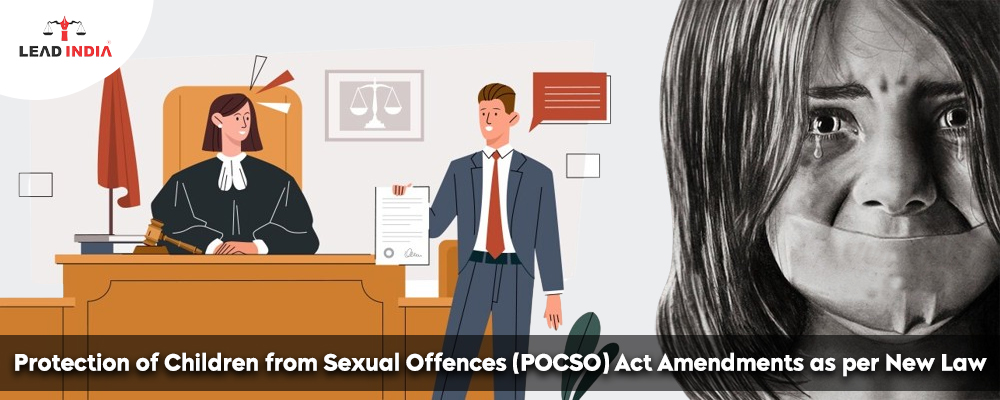In India, no laws were passed until 2012 to address crimes against children, despite the United Nations adopting the Convention on the Rights of the Child in 1989. To safeguard children against all types of sexual abuse, the Protection of Children from Sexual Offences Act was passed in 2012. In the event of aggravated penetrative sexual assault, it stipulated that offenders would face the death penalty in addition to a minimum of 20 years in jail.
Need A Legal Advice
The internet is not a lawyer and neither are you. Talk to a real lawyer about your legal issue

POCSO Amendment Act 2019
In 2019, the POCSO Act was amended to strengthen the penalties for sexual offenses against minors and to safeguard them against sexual assault and harassment. This amendment has the following features:
- The measure renders child abuse crimes gender-neutral.
- To achieve early sexual maturity for penetrating sexual assault, the concept of “sexual assault” has been expanded to include giving hormones or other chemicals to minors.
- According to the Act, any visual representation of sexually explicit behavior involving children, including pictures, videos, recordings, or computer-generated images that are identical to real children, is considered child pornography.
- Since it defines child pornography precisely and establishes penalties for it, the Act is essential.
- Along with making it illegal, the revisions suggest bringing pornographic material into compliance with the IT Act.
- The Act includes a death penalty clause to strengthen the penalties for sexual offenses against minors.
- The fact that individuals who perpetrate intrusive sexual attacks on minors under 16 years of age face sentences of up to 20 years in jail, with the possibility of life imprisonment, as well as a fine, is one of the most significant aspects.
- The statute raises the minimum sentence for serious penetrative sexual assault from 10 to 20 years, and the maximum punishment to the death penalty.
- The Act, which aims to reduce child pornography, stipulates that anyone who exploits a kid for pornographic purposes must pay a fine and serve a maximum of five years in jail.
- A fine and a maximum sentence of seven years would apply in the event of a second or subsequent conviction.
- To expedite the resolution of outstanding cases under POCSO, the government has now approved over a thousand fast-track courts.
Case Laws
- Jarnail Singh v. State of Haryana (2013): The daughter of Savitri Devi was allegedly abducted by the appellant and sexually assaulted while she slept. In this decision, the Supreme Court of India noted that the Juvenile Justice (Care and Protection of Children) Rules, 2007 mechanism for determining the age of a child in conflict with the law can also be applied to cases under the POCSO Act, 2012. By using this criteria, the Court found Jarnail Singh, the appellant, guilty.
- Attorney General for India v. Satish and another (2021): The Bombay High Court’s Nagpur Bench decided in Satish Ragde v. the State of Maharashtra (2021) that, by the POCSO Act, 2021, grabbing a child’s breasts without creating “skin-to-skin contact” amounted to molestation. There was a great deal of animosity for Justice Pushpa Ganediwala’s ruling. In the current case of Attorney General for India versus Satish and another (2021), a bench made up of Justices Uday Umesh Lalit, S Ravindra Bhat, and Bela M Trivedi heard appeals from the Attorney General of India, the National Commission for Women, and the State of Maharashtra against the ruling of this High Court. Overturning the Bombay High Court’s ruling, the SC noted that the case in question would be suitable for applying the statutory interpretation principle known as the “mischief rule.” It underlined that to prevent injury and advance the remedy, courts must continuously interpret the law.
A child’s psychological trauma from sexual offense leads to depression, emotional anguish, and cognitive damage. The POCSO Act, without a doubt, contains provisions meant to shield minors against child porn and sexual abuse. Sexual offenses against minors are now punishable by more severe penalties following the 2019 amendment. To reduce sexual offenses against children, India still has a long way to go.
Lead India provides free legal advice and online information among other legal services. We offer a platform where you can talk with a lawyer and ask legal questions. Lead India’s lawyers can help you with any legal matters. Lead India offers free online legal help in India. In addition to providing legal advice online, Lead India allows users to ask questions for free.





 Talk to a Lawyer
Talk to a Lawyer